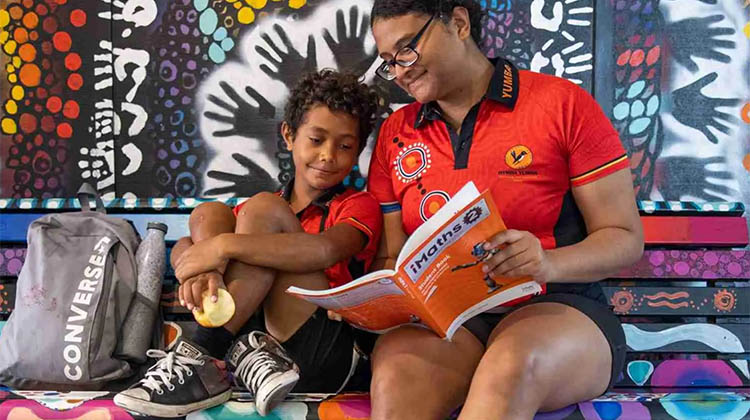Embedding First Nations Culture Boosts Outcomes

A south-east Queensland school is doing things a bit differently and lifting learning outcomes for First Nations students.
By putting culture and traditional knowledge at the centre of its curriculum, Hymba Yumba Independent School, on the traditional land of the Jagera, Yuggera and Ugarapul people, is creating a place of cultural responsiveness.
The school has introduced several programs to improve student outcomes and attendance, including therapy dogs, cultural classes, and Bunji (brother) and Tidda (sister) groups.
Hymba Yumba Chief Executive Officer Karla Brady said the school was focused on setting its jarjum (child/children) up for success.
“First Nations knowledge and perspectives come first for us. We’re drawing on ways of knowing, learning and doing that have been around for over 3,000 generations. Instead of having culture fitted into a curriculum, we have flipped the model so the curriculum fits into culture.
“Our First Nations jarjum deserve to see themselves in everything they see and do, including in the curriculum. Through this approach we can engage and support them on whatever path they choose.”
Hymba Yumba opened in 2011 with 50 jarjums and 8 staff. It now has almost 300 jarjums, more than 50 staff and waitlists across primary and high school. The school doesn’t charge tuition fees and families are asked to pay only a Resource Levy of between $225 and $425.
“There is a lot of excitement for what we’re doing here, because our innovative approach is delivering results,” Mrs Brady said.
“We have proven that our model works, however we don't have the space to grow and expand any further.
“We need the land beside us returned so we can fulfil our master plan of a First Nations education precinct that offers opportunities for Closing the Gap, authentic First Nations engagement, and broader community experiences, employment and self-sustained funding.”
Enrolments of Aboriginal and Torres Strait Islander students have grown at an average rate of more than 6% per year over the past decade. There are 46 Independent schools where the majority of students are Aboriginal or Torres Strait Islander, including 10 in Queensland.
Enrolments at Independent schools in Queensland increased 22% between 2018 and 2023, with more than 16% of school students in the electorate of Blair attending an Independent school.
Hymba Yumba is one of 10 case studies included in Independent Schools Australia’s recent report Improving Outcomes For All: Leading Reform Through Innovation, which illustrated innovative approaches to the national school reform priority areas of equity, wellbeing and workforce.
Independent Schools Australia Chief Executive Officer Graham Catt said Hymba Yumba’s dynamic approach to education was delivering clear benefits to its students and the community.
“It’s crucial that schools such as Hymba Yumba have access to adequate funding and resources to maintain the positive impact they have on our communities.”
Mr Catt said ISA would continue to collaborate with the Australian Government to ensure Independent schools receive the support necessary to serve their communities and deliver strong learning outcomes.